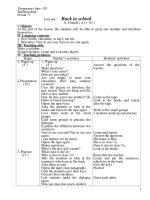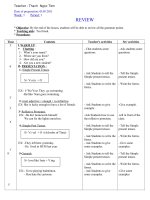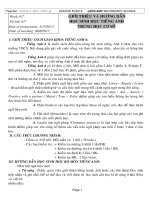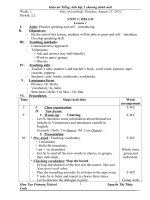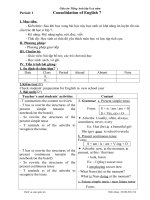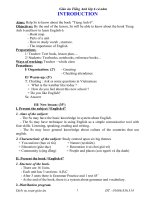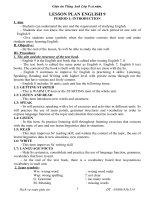- Trang chủ >>
- Mầm non - Tiểu học >>
- Lớp 5
Giao an tieng anh lop 5 ca nam
Bạn đang xem bản rút gọn của tài liệu. Xem và tải ngay bản đầy đủ của tài liệu tại đây (766.7 KB, 140 trang )
Lang Co Primary School
Week: 1
Period: 1,2
Date of teaching:
Unit 1: WHAT’S YOUR ADDRESS?
Lesson 1
I. Objectives: By the end of this unit pupils can
- Use the words and phrases related to the topics addresses and hometown. Ask and
answer questions about one’s address, using What’s your address? – It’s...
- Develop Ss speaking and listening skills.
- Ss look after , solve problems and study themselves.
- Studious and obedient students and love their hometown, family and friends.
II. Languages focus:
- Sentence Pattners: What’s your address? – It’s...
- Vocabulary: address, crowded, lane, quiet, tower, road.
III. Teaching aids:
1. Teacher’s: student’s and teacher’s book, pictures, cassette.
2. Students’: books, notebooks, workbooks.
IV. Teaching processes:
1. Class organization:
- Greeting. Checking for the students' attendance.
2. Oral test: - Have pupils describe things in the room.
3. New lesson
Teacher’s activities
Students’ activities
Warm up: Play slap the - The class play: using the pictures and names of
board
characters that they have learnt in Tieng Anh 3,4.
1. Look, listen and repeat.
- Introduce the dialogue.
- Look at the pictures in the book, identify the
characters in the picture on page 30 and what they
are saying.
- Play the recording
- Listen to Mai and Nam greeting. Nam
introducing Mai to Trung.
- Check and corect.
- Ss listen and repeat in chorus two times.
- Read in group/ pair: One repeats Mai’s part, the
- Elicits the structure
other repeats Nam’s part and Trung’ part.
- Ss give new structure sentence:
2. Point and say
- What’s your address? – It’s...
- Teach vocabulary:
- Note write down new words and read after T.
Play game: What and where ( Whole class)
Check vocab: what & where - Revise numbers 10 to 100 with the class.
- Model sentence.
- Pupils guess and complete the speech bubbles.
- Monitor the activity and - Look and find out the model sentences
offer help, if necessary.
- Point the pictures and practise asking and
answering question about one’s address.
Teacher: Huỳnh Thị Bích Thùy
1
Lang Co Primary School
- Check and correct.
- 2 - 3 pairs perform their task at the front of the
class. The rest of the class observe and give
3. Let’s Talk
comments.
- Give tasks.
- Ss work in pairs to practise asking and answering
question about one’s address.
- Practise in pairs
- Correct their
- 6-7 pairs perform their task at the front of the
pronunciation and mistake. class. The rest of the class observe and give
4.Consolidation
comments.
Summary the lesson
- Do exercises in workbook, learn by heart the
5.Homework
new words.
Unit 1: WHAT’S YOUR ADDRESS?
Lesson 2
Teacher: Huỳnh Thị Bích Thùy
2
Lang Co Primary School
I. Objectives: By the end of this unit pupils can
- Use the words and phrases related to the topics addresses and hometown. Ask and
answer questions about what a village/town/city is like, using What’s the ... like? –
It’s...
- Develop Ss speaking and listening skills.
- Ss look after , solve problems and study themselves.
- Studious and obedient students and love their hometown, family and friends.
II. Languages focus:
- Sentence Pattners: What’s the ... like? – It’s...
- Vocabulary: crowded, lane, quiet, busy...
III. Teaching aids:
1. Teacher’s: student’s and teacher’s book, pictures, cassette.
2. Students’: books, notebooks, workbooks.
IV. Teaching processes:
1. Class organization:
- Greeting. Checking for the students' attendance.
2. Oral test: - chating with pupils describe things in the house.
3. New lesson
Teacher’s activities
Students’ activities
Warm up: Play spelling bee - The class play: Spelling bee with lane, plat
mountain, city, town... Finally, pupils make
1. Look, listen and repeat.
sentences with the words used in the game.
- Introduce the dialogue.
- Look at the pictures in the book guess what the
story is about and point at each picture to elicit
their answers to these questions .
- Play the recording
- Listen follow in their book.
- Ss listen and repeat in chorus two times.
- Check and corect.
- Read in group/ pair: One repeats Mai’s part, the
other repeats Nam’s part and Trung’ part.
- Elicits the structure
- Ss give new structure sentence:
- What’s the ... like? – It’s...
2. Point and say
- Note write down new words and read after T.
- Teach vocabulary: busy, Play game: What and where ( Whole class)
pretty, crowded.
- Revise adjectives: big, far, large, small.( class
Check vocab: what & where repeat twice)
- Model sentence.
- Look and find out the model sentences
- Monitor the activity and - Point the pictures and practise asking and
offer help, if necessary.
answering question What’s the ... like? – It’s...
- 2 - 3 pairs perform their task at the front of the
- Check and correct.
class. The rest of the class observe and give
comments.
3. Let’s Talk
- Ss work in pairs to practise asking and answering
- Give tasks.
questions about where they live.
- Monitor the activity and - Pupils practise answer ing the questions with
Teacher: Huỳnh Thị Bích Thùy
3
Lang Co Primary School
offer help, if necessary.
information about themselves.
- 6-7 pairs perform their task at the front of the
- Correct their
class. The rest of the class observe and give
pronunciation and mistake. comments.
4.Consolidation
Summary the lesson
- Do exercises in workbook, learn by heart the
5.Homework
new words.
Week: 2
Period: 3,4
Teacher: Huỳnh Thị Bích Thùy
Date of teaching:
4
Lang Co Primary School
Unit 1: WHAT’S YOUR ADDRESS?
Lesson 3
I. Objectives: By the end of this unit pupils can
- Pronounce two-syllable words with the stress on the first syllable: ’city,
’mountains, ’tower and ’village.
- Develop Ss speaking and listening skills.
- Ss look after , solve problems and study themselves.
- Studious and obedient students and love their hometown, family and friends.
II. Languages focus:
- Phonetic: ’city, ’mountains, ’tower and ’village.
III. Teaching aids:
1. Teacher’s: student’s and teacher’s book, pictures, cassette.
2. Students’: books, notebooks, workbooks.
IV. Teaching processes:
1. Class organization:
- Greeting. Checking for the students' attendance.
2. Oral test: - Have pupils describe things in the room.
3. New lesson
Teacher’s activities
Students’ activities
Warm up: Play bingo game - The class play: bingo game with big,quiet,busy
flat, mountain, city, town... Finally, pupils make
1. Look, listen and repeat.
sentences with the words used in the game.
- Introduce the pronounce
- Look at the pronounce two-syllable words with
two-syllable words with the the stress on the first syllable.
stress on the first syllable.
- Listen follow in their book.
- Guide Ss produce the
- Ss learn to produce the sound of the letters:’city,
sound of the letters.
’mountains, ’tower and ’village.
- Listen the CD and repeat the words & sentences
in chorus.
- Check and corect.
- Read in groups/ in pairs.
- Give out and check.
2. Listen and circle a or b.
Then say sentences aloud.
- Read the sentences in silence before listening the
- Give tasks.
recording to do the task.
- Guide Ss to listen & circle.
- Pupils listen the recording 2 times and circle a or
- Play the recording.
b to complete sentences.
- Compare the answers each other before checking
- Check and correct.
as a class.
1.b
2.a
3. a
- 3- 4 pupils give the keys. The rest of the class
3. Let’s chant
observe and give comments.
- Introduce the Chant :
- Ps listen to the tape & read the chant line by line.
Teacher: Huỳnh Thị Bích Thùy
5
Lang Co Primary School
Where do you live?
- Ps practise chanting: one chants the questions
and the other chants the answers.
-Teacher reinforce their
- Ps practise chanting and doing actions.
pronunciation
- 2-3 groups to say the chant and do actions.
4.Consolidation
Summary the lesson
5.Homework
- Ss to do exercises in C, D (WB) .
Teacher: Huỳnh Thị Bích Thùy
6
Lang Co Primary School
Unit 2: I ALWAYS GET UP EARLY. HOW ABOUT YOU?
Lesson 1
I. Objectives: By the end of this unit pupils can
- Use the words and phrases related to the topic Daily routines. Ask and answer
questions about someone’s Daily routines, using What do you do...? – I always/
usually/often/sometimes....
- Develop Ss speaking and listening skills.
- Ss look after , solve problems and study themselves.
- Studious and obedient students and love their hometown, family and friends.
II. Languages focus:
- Sentence Pattners: What do you do...? – I always/ usually/often/sometimes....
- Vocabulary: always,often, usually, sometimes, brush teeth, morning exercise....
III. Teaching aids:
1. Teacher’s: student’s and teacher’s book, pictures, cassette.
2. Students’: books, notebooks, workbooks.
IV. Teaching processes:
1. Class organization:
- Greeting. Checking for the students' attendance.
2. Oral test: - Have pupils say about where they live.
3. New lesson
Teacher’s activities
Students’ activities
Warm up: Chatting about - The class chatting about their house and say
the house.
about their address.
1. Look, listen and repeat.
- Introduce the dialogue.
- Look at the pictures in the book, identify the
characters in the picture on page 12 and what they
are saying.
- Play the recording
- Listen to Quan and Tom on the tape.
- Ss listen and repeat line by line in chorus twice.
- Check and corect.
- Read in group/ pair: One repeats Quan’s part, the
other repeats Tom’s part.
- Elicits the structure
- Ss give new structure sentence:
- What do you do...? – I always/
2. Point and say
usually/often/sometimes....
- Teach vocabulary:
- Note write down new words and read after T.
Check vocab: what & where - Ps look at the pictures and read words and
phrases under each pictures.
Play game: What and where ( Whole class)
- Model sentence.
- Pupils guess and complete the speech bubbles.
- Monitor the activity and - Look and find out the model sentences
offer help, if necessary.
- Point the pictures and practise asking and
answering question What do you do...?
- Check and correct.
- 2 - 3 pairs perform their task at the front of the
Teacher: Huỳnh Thị Bích Thùy
7
Lang Co Primary School
class. The rest of the class observe and give
3. Let’s Talk
comments.
- Give tasks.
- Ss work in pairs to practise asking and answering
question What do you do...?.
- Practise in pairs
- Correct their
- 6-7 pairs perform their task at the front of the
pronunciation and mistake. class. The rest of the class observe and give
4.Consolidation
comments.
Summary the lesson
- Do exercises in workbook, learn by heart the
5.Homework
new words.
Teacher: Huỳnh Thị Bích Thùy
8
Lang Co Primary School
Week: 3
Period: 5,6
Date of teaching:
Unit 2: I ALWAYS GET UP EARLY. HOW ABOUT YOU?
Lesson 2
I. Objectives: By the end of this unit pupils can
- Use the words and phrases related to the topics Daily routines. Ask and answer
questions about frequency, using How often...? – I...every day/once/twice... a week.
- Develop Ss speaking and listening skills.
- Ss look after , solve problems and study themselves.
- Studious and obedient students and love their hometown, family and friends.
II. Languages focus:
- Sentence Pattners: How often...? – I...every day/once/twice... a week/ a month.
- Vocabulary: once, twice, do, month, week, ...
III. Teaching aids:
1. Teacher’s: student’s and teacher’s book, pictures, cassette.
2. Students’: books, notebooks, workbooks.
IV. Teaching processes:
1. Class organization:
- Greeting. Checking for the students' attendance.
2. Oral test: - chating with pupils about their Daily routines.
3. New lesson
Teacher’s activities
Students’ activities
Warm up: Sing a song: This - The class sing follow: This is the way we do
is the way we do things.
things song.
1. Look, listen and repeat.
- Look at the pictures in the book guess what the
- Introduce the dialogue.
story is about and point at each picture to elicit
their answers to these questions .
- Listen follow in their book.
- Play the recording
- Ss listen and repeat in chorus two times.
- Read in group/ pair: One repeats Nam’s part, the
- Check and corect.
other repeats Linda’part.
- Ss give new structure sentence:
- Elicits the structure
- How often...? – I...every day/once/twice... a
2. Point and say
week/ a month
- Teach vocabulary: once, - Note write down new words and read after T.
twice, do, month
Play game: What and where ( Whole class)
- Model sentence.
- Look and find out the model sentences.
- Monitor the activity and - Point the pictures and practise asking and
offer help, if necessary.
answering question How often...? – I...every
day/once/twice... a week/ a month
- Check and correct.
- 2 - 3 pairs perform their task at the front of the
Teacher: Huỳnh Thị Bích Thùy
9
Lang Co Primary School
class. The rest of the class observe and give
comments.
3. Let’s Talk
- Talking about their daily rountines and how often
- Give tasks.
they do something, using What do you do...? – I
- Monitor the activity and usually.... and
offer help, if necessary.
How often...? – I...once/twice... a week/ a month
- Ss work in pairs.
- Correct their
- Pupils practise answer ing the questions with
pronunciation and mistake. information about themselves.
4.Consolidation
- 6-7 pairs perform their task at the front of the
Summary the lesson
class. The rest of the class observe and give
5.Homework
comments.
- Do exercises in workbook, learn by heart the
new words.
Teacher: Huỳnh Thị Bích Thùy
10
Lang Co Primary School
Unit 2: I ALWAYS GET UP EARLY. HOW ABOUT YOU?
Lesson 3
I. Objectives: By the end of this unit pupils can
- Pronounce two-syllable words with the stress on the first syllable: ’always,
’often, ’usuallyr and ’sometimes.
- Develop Ss speaking and listening skills.
- Ss look after , solve problems and study themselves.
- Studious and obedient students and love their hometown, family and friends.
II. Languages focus:
- Phonetic: ’always, ’often, ’usuallyr and ’sometimes.
III. Teaching aids:
1. Teacher’s: student’s and teacher’s book, pictures, cassette.
2. Students’: books, notebooks, workbooks.
IV. Teaching processes:
1. Class organization:
- Greeting. Checking for the students' attendance.
2. Oral test: - Have pupils ask and answer about their daily rountines.
3. New lesson
Teacher’s activities
Students’ activities
Warm up: Chatting with ps - The class chatting about their daily rountines.
1. Look, listen and repeat.
- Look at the pronounce two-syllable words with
- Introduce the pronounce
the stress on the first syllable.
two-syllable words with the - Listen follow in their book.
stress on the first syllable.
- Ss learn to produce the sound of the letters:
- Guide Ss produce the
’always, ’often, ’usuallyr and ’sometimes.
sound of the letters.
- Listen the CD and repeat the words & sentences
in chorus.
- Read in groups/ in pairs.
- Check and corect.
- Give out and check.
2. Listen and circle a or b. - Read the sentences in silence before listening the
Then say sentences aloud.
recording to do the task.
- Give tasks.
- Play the recording.
- Pupils listen the recording 2 times and circle a or
b to complete sentences.
- Check and correct.
- Compare the answers each other before checking
1.a
2.b
3. a
4.b
as a class.
- 3- 4 pupils give the keys. The rest of the class
3. Let’s chant
observe and give comments.
- Introduce the Chant :
- Ps listen to the tape & read the chant line by line.
Teacher: Huỳnh Thị Bích Thùy
11
Lang Co Primary School
What do you do in the
- Ps practise chanting: one chants the questions
morning?
and the other chants the answers.
- Ps practise chanting and doing actions.
-Teacher reinforce their
- 2 groups to say the chant and do actions. The rest
pronunciation
of the class claps along to the rhythm.
4.Consolidation
Summary the lesson
5.Homework
- Ss to do exercises in C, D (WB) .
Teacher: Huỳnh Thị Bích Thùy
12
Lang Co Primary School
Week: 4
Period: 7,8
Date of teaching:
Unit 3: WHERE DID YOU GO ON HOLIDAY?
Lesson 1
I. Objectives: By the end of this unit pupils can
- Use the words and phrases related to the topics past holidays. Ask and answer
questions about past holidays, using Where did you go on holiday...? – I went to....
- Develop Ss speaking and listening skills.
- Ss look after , solve problems and study themselves.
- Studious and obedient students and love their hometown, family and friends.
II. Languages focus:
- Sentence Pattners: Where did you go on holiday...? – I went to.....
- Vocabulary: island, ancient, town, imperial, city, ...
III. Teaching aids:
1. Teacher’s: student’s and teacher’s book, pictures, cassette.
2. Students’: books, notebooks, workbooks.
IV. Teaching processes:
1. Class organization:
- Greeting. Checking for the students' attendance.
2. Oral test: - chating with pupils about some famous holiday places.
3. New lesson
Teacher’s activities
Students’ activities
Warm up: play Pelmanism - The class play game: look at the some pictures
game.
of famous holiday places and say their name.
1. Look, listen and repeat.
- Look at the pictures to identify the
- Introduce the dialogue.
characters(Mai and Peter) and the context in the
book guess what the story is about and point at
each picture to elicit their answers to these
questions.
- Play the recording
- Listen follow in their book.
- Ss listen and repeat in chorus two times.
- Check and corect.
- Read in group/ pair: One repeats Mai’s part, the
other repeats Peter’part.
- Elicits the structure
- Ss give new structure sentence:
2. Point and say
Where did you go on holiday...? – I went to.....
- Teach vocabulary: once, - Note write down new words and read after T.
twice, do, month
Play game: What and where ( Whole class)
- Model sentence.
- Say phrases under the pictures.
Teacher: Huỳnh Thị Bích Thùy
13
Lang Co Primary School
- Monitor the activity and - Look and find out the model sentences.
offer help, if necessary.
- Point the pictures and practise asking and
answering question Where did you go on
- Check and correct.
holiday...? – I went to.....
- 2 - 3 pairs perform their task at the front of the
class. The rest of the class observe and give
3. Let’s Talk
comments.
- Give tasks.
- Talking about where someone went on his/her
- Monitor the activity and last holiday, using Where did you go on holiday...?
offer help, if necessary.
– I went to.....
- Ss work in pairs.
- Correct their
- Pupils practise answering the questions with
pronunciation and mistake. information about themselves.
4.Consolidation
- 6-7 pairs perform their task at the front of the
Summary the lesson
class. The rest of the class observe and give
5.Homework
comments.
- Do exercises in workbook, learn by heart the
new words.
Teacher: Huỳnh Thị Bích Thùy
14
Lang Co Primary School
Unit 3: WHERE DID YOU GO ON HOLIDAY?
Lesson 2
I. Objectives: By the end of this unit pupils can
- Use the words & phrases related to the topics means of transport. Ask and answer
questions about means of transport, using How did you get there?I went by ...
- Develop Ss speaking and listening skills.
- Ss look after , solve problems and study themselves.
- Studious and obedient students and love their hometown, family and friends.
II. Languages focus:
- Sentence Pattners: How did you get there?I went by ...
- Vocabulary: train, taxi, motorbike, underground,...
III. Teaching aids:
1. Teacher’s: student’s and teacher’s book, pictures, cassette.
2. Students’: books, notebooks, workbooks.
IV. Teaching processes:
1. Class organization:
- Greeting. Checking for the students' attendance.
2. Oral test: - chating with pupils about their Daily routines.
3. New lesson
Teacher’s activities
Students’ activities
Warm up: bingo game.
- The class play bingo game: using the words for
places and means of transport learnt. At the end of
1. Look, listen and repeat.
the game, ps ask & answer questions in the game.
- Introduce the dialogue.
- Look at the pictures in the book guess what the
story is about and point at each picture to elicit
their answers to these questions .
- Play the recording
- Listen follow in their book.
- Ss listen and repeat in chorus two times.
- Check and corect.
- Read in group/ pair: One repeats Tony’s part, the
other repeats Phong’part.
- Elicits the structure
- Ss give new structure sentence:
2. Point and say
- How did you get there?I went by ...
- Teach vocabulary:
- Note write down new words and read after T.
train,
taxi,
motorbike, Play game: What and where ( Whole class)
underground
- Look and find out the model sentences.
- Model sentence.
- Point the pictures & practise asking & answering
Teacher: Huỳnh Thị Bích Thùy
15
Lang Co Primary School
- Monitor the activity and question How did you get there?I went by ...
offer help, if necessary.
- 2 - 3 pairs perform their task at the front of the
class. The rest of the class observe and give
- Check and correct.
comments.
3. Let’s Talk
- Talking about means of transport, using - How
- Give tasks.
did you get there?I went by ...
- Ss work in pairs.
- Monitor the activity and - Pupils practise further asking and answering the
offer help, if necessary.
questions about means of transport.
- Correct their
- 6-7 pairs perform their task at the front of the
pronunciation and mistake. class. The rest of the class observe and give
4.Consolidation
comments.
Summary the lesson
- Do exercises in workbook, learn by heart the
5.Homework
new words.
Teacher: Huỳnh Thị Bích Thùy
16
Lang Co Primary School
Week: 5
Period: 9,10
Date of teaching:
Unit 3: WHERE DID YOU GO ON HOLIDAY?
Lesson 3
I. Objectives: By the end of this unit pupils can
- Pronounce two-syllable words with the stress on the first syllable: ’always,
’often, ’usuallyr and ’sometimes.
- Develop Ss speaking and listening skills.
- Ss look after , solve problems and study themselves.
- Studious and obedient students and love their hometown, family and friends.
II. Languages focus:
- Phonetic: ’always, ’often, ’usuallyr and ’sometimes.
III. Teaching aids:
1. Teacher’s: student’s and teacher’s book, pictures, cassette.
2. Students’: books, notebooks, workbooks.
IV. Teaching processes:
1. Class organization:
- Greeting. Checking for the students' attendance.
2. Oral test: - Have pupils ask and answer about their daily rountines.
3. New lesson
Teacher’s activities
Students’ activities
Warm up: Chatting with ps - The class chatting about their daily rountines.
1. Look, listen and repeat.
- Look at the pronounce two-syllable words with
- Introduce the pronounce
the stress on the first syllable.
two-syllable words with the - Listen follow in their book.
stress on the first syllable.
- Ss learn to produce the sound of the letters:
- Guide Ss produce the
’always, ’often, ’usuallyr and ’sometimes.
sound of the letters.
- Listen the CD and repeat the words & sentences
in chorus.
- Read in groups/ in pairs.
- Check and corect.
- Give out and check.
2. Listen and circle a or b. - Read the sentences in silence before listening the
Then say sentences aloud.
recording to do the task.
Teacher: Huỳnh Thị Bích Thùy
17
Lang Co Primary School
- Give tasks.
- Play the recording.
- Check and correct.
1.a
2.b
3. a
4.b
3. Let’s chant
- Introduce the Chant :
What do you do in the
morning?
-Teacher reinforce their
pronunciation
4.Consolidation
5.Homework
- Pupils listen the recording 2 times and circle a or
b to complete sentences.
- Compare the answers each other before checking
as a class.
- 3- 4 pupils give the keys. The rest of the class
observe and give comments.
- Ps listen to the tape & read the chant line by line.
- Ps practise chanting: one chants the questions
and the other chants the answers.
- Ps practise chanting and doing actions.
- 2 groups to say the chant and do actions. The rest
of the class claps along to the rhythm.
Summary the lesson
- Ss to do exercises in C, D (WB) .
Teacher: Huỳnh Thị Bích Thùy
18
Lang Co Primary School
Unit 4: DID YOU GO TO THE PARTY?
Lesson 1
I. Objectives: By the end of this unit pupils can
- Use the words and phrases related to the topics Past activities. Ask and answer
questions about whether someone did something, using Did you...?- Yes, I did/ No,
I didn’t.
- Develop Ss speaking and listening skills.
- Ss look after , solve problems and study themselves.
- Studious and obedient students and love their hometown, family and friends.
II. Languages focus:
- Sentence Pattners: Did you...?- Yes, I did/ No, I didn’t.
- Vocabulary: alot of, invite, join, funfair, chat ...
III. Teaching aids:
1. Teacher’s: student’s and teacher’s book, pictures, cassette.
2. Students’: books, notebooks, workbooks.
IV. Teaching processes:
1. Class organization: - Greeting. Checking for the students' attendance.
2. Oral test: - chating with pupils about their last holiday .
3. New lesson
Teacher’s activities
Students’ activities
Warm up: play game
- The class play game: slap the board, using
1. Look, listen and repeat.
motorbike, bike, taxi, underground, train, bus...
- Introduce the dialogue.
- Look at the pictures to identify the
characters(Tony, Linda, Mai and Phong) and the
context in the book guess what the story is about
and point at each picture to elicit their answers to
- Play the recording
these questions.
- Listen follow in their book.
- Check and corect.
- Ss listen and repeat in chorus two times.
- Read in group/ pair: One repeats Tony’s part, the
- Elicits the structure
other repeats Linda’part.
2. Point and say
- Ss give new structure sentence:
- Teach vocabulary:
Did you...?- Yes, I did/ No, I didn’t.
- Teach the past simlpe - Note write down new words and read after T.
Teacher: Huỳnh Thị Bích Thùy
19
Lang Co Primary School
forms of verb.
Play game: What and where ( Whole class)
- Model sentence.
- Say phrases under the pictures.
- Monitor the activity and - Look and find out the model sentences.
offer help, if necessary.
- Point the pictures and practise asking and
answering question Did you...?- Yes, I did/ No, I
- Check and correct.
didn’t, using the prompts under the pictures.
- 2 - 3 pairs perform their task at the front of the
class. The rest of the class observe and give
3. Let’s Talk
comments.
- Give tasks.
- Talking about whether someone did something,
- Monitor the activity and using Did you...?- Yes, I did/ No, I didn’t
offer help, if necessary.
- Ss work in pairs.
- Pupils practise answering the questions with
- Correct their
information about themselves.
pronunciation and mistake. - 6-7 pairs perform their task at the front of the
4.Consolidation
class. The rest of the class observe and give
Summary the lesson
comments.
5.Homework
- Do exercises in workbook, learn by heart the
new words.
Teacher: Huỳnh Thị Bích Thùy
20
Lang Co Primary School
Week: 6
Period: 11,12
Date of teaching:
Unit 4: DID YOU GO TO THE PARTY?
Lesson 2
I. Objectives: By the end of this unit pupils can
- Use the words & phrases related to the topics Past activities. Ask and answer
questions about what someone did at a party, using What did you do at the party?
We ...
- Develop Ss speaking and listening skills.
- Ss look after , solve problems and study themselves.
- Studious and obedient students and love their hometown, family and friends.
II. Languages focus:
- Sentence Pattners: What did you do at the party? We ...
- Vocabulary: party, take part, cartoon, eat....
III. Teaching aids:
1. Teacher’s: student’s and teacher’s book, pictures, cassette.
2. Students’: books, notebooks, workbooks.
IV. Teaching processes:
1. Class organization:
- Greeting. Checking for the students' attendance.
2. Oral test: - chating with pupils about their Daily routines.
3. New lesson
Teacher’s activities
Students’ activities
Warm up: bingo game.
- The class play bingo game: using the words for
Past activities. At the end of the game, ps ask &
1. Look, listen and repeat.
answer questions in the game.
- Introduce the dialogue.
- Look at the pictures in the book guess what the
story is about and point at each picture to elicit
their answers to these questions .
- Play the recording
- Listen follow in their book.
- Ss listen and repeat in chorus two times.
- Check and corect.
- Read in group/ pair: One repeats Nam’s part, the
other repeats Peter’part.
Teacher: Huỳnh Thị Bích Thùy
21
Lang Co Primary School
- Elicits the structure
- Ss give new sentence:
2. Point and say
- What did you do at the party? We ...
- Teach vocabulary:
- Note write down new words and read after T.
Play game: What and where ( Whole class)
- Model sentence.
- Look and find out the model sentences.
- Monitor the activity and - Point the pictures & practise asking & answering
offer help, if necessary.
question - What did you do at the party? We ...
- 2 - 3 pairs perform their task at the front of the
- Check and correct.
class. The rest of the class observe and give
3. Let’s Talk
comments.
- Give tasks.
- Talking about about what someone did at a party,
using Did you...? / How was it?/ What did you do
- Monitor the activity and at the party? We ...
offer help, if necessary.
- Ss work in pairs.
- Correct their
- Pupils practise further asking and answering the
pronunciation and mistake. questions about what someone did at a party
4.Consolidation
- 6-7 pairs perform their task at the front of the
Summary the lesson
class. The rest of the class observe and give
comments.
5.Homework
- Do exercises in workbook, learn by heart the
new words.
Teacher: Huỳnh Thị Bích Thùy
22
Lang Co Primary School
Unit 4: DID YOU GO TO THE PARTY?
Lesson 3
I. Objectives: By the end of this unit pupils can
- Pronounce two-syllable words with the stress on different syllable: 'party,
'Sunday, en'joyed and in'vite.
- Develop Ss speaking and listening skills.
- Ss look after , solve problems and study themselves.
- Studious and obedient students and love their hometown, family and friends.
II. Languages focus:
- Phonetic: 'party, 'Sunday, en'joyed and in'vite.
III. Teaching aids:
1. Teacher’s: student’s and teacher’s book, pictures, cassette.
2. Students’: books, notebooks, workbooks.
IV. Teaching processes:
1. Class organization:
- Greeting. Checking for the students' attendance.
2. Oral test: - Have pupils ask and answer about their Past activities.
3. New lesson
Teacher’s activities
Students’ activities
Warm up: Chatting with ps -The class chatting about their Past activities. Then
listen What did you do on Teacher’s day? Song.
1. Look, listen and repeat.
- Introduce the pronounce
- Look at the pronounce two-syllable words with
two-syllable words with the the stress on different syllable.
stress on different syllable.
- Listen follow in their book.
- Guide Ss produce the
- Ss learn to produce the sound of the letters:
sound of the letters.
'party, 'Sunday, en'joyed and in'vite.
- Listen the CD and repeat the words & sentences
in chorus.
- Check and corect.
- Read in groups/ in pairs.
- Give out and check.
2. Mark the words stress.
Teacher: Huỳnh Thị Bích Thùy
23
Lang Co Primary School
Then say the words aloud.. - Read the sentences in silence before listening the
- Give tasks.
recording to do the task.
- Monitor the activity and - Swap and compare their answers in pairs before
offer help, if necessary.
checking as a class.
- 3- 4 pupils read out all words. The rest of the
- Check and correct.
class observe and give comments.
3. Let’s chant
- Ps listen to the tape & read the chant line by line.
- Introduce the Chant :
- Ps practise chanting: one chants the questions
When was your birthday?
and the other chants the answers.
- Ps practise chanting and doing actions.
-Teacher reinforce their
- 2 groups to say the chant and do actions. The rest
pronunciation
of the class claps along to the rhythm.
4.Consolidation
Summary the lesson
5.Homework
- Ss to do exercises in C, D (WB) .
Teacher: Huỳnh Thị Bích Thùy
24
Lang Co Primary School
Week: 7
Period: 13,14
Date of teaching:
Unit 5: WHERE WILL YOU BE THIS WEEKEND?
Lesson 1
I. Objectives: By the end of this unit pupils can
- Use the words and phrases related to the topics future activities. Ask and answer
questions about where someone will be, using Where will you be...?- I think I’ll
be....
- Develop Ss speaking and listening skills.
- Ss look after , solve problems and study themselves.
- Studious and obedient students and love their hometown, family and friends.
II. Languages focus:
- Sentence Pattners: Where will you be...?- I think I’ll be....
- Vocabulary: will, think, may, countryside, beach, on, at, by, in, weekend.
III. Teaching aids:
1. Teacher’s: student’s and teacher’s book, pictures, cassette.
2. Students’: books, notebooks, workbooks.
IV. Teaching processes:
1. Class organization: - Greeting. Checking for the students' attendance.
2. Oral test: - chating with pupils about their last party .
3. New lesson
Teacher’s activities
Students’ activities
Warm up:
- The class chant: When was your birthday?
1. Look, listen and repeat.
- Look at the pictures to identify the
- Introduce the dialogue.
characters(Tony, Mai and Phong) and the context
in the book guess what the story is about and point
at each picture to elicit their answers to these
questions.
Teacher: Huỳnh Thị Bích Thùy
25

